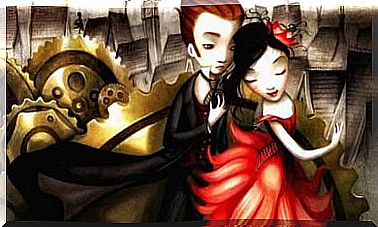Why Can’t I Express Anger?

Anger, despite its bad reputation, is a very valuable help when managed well. In fact, some people may feel that they are unable to express their anger, even when they have been hurt or treated unfairly, and this makes them feel very bad.
To be sure, these people do get angry; they are able to feel that other people have violated their rights. What happens is that their coping strategy is one of extreme restraint, often driven by insecurity and lack of social skills. So what they achieve is that the energy of the emotion turns against itself and its well-being.

Why is anger sometimes necessary?
Anger, like all other basic emotions, performs several essential functions. Despite its reputation for negative emotion, it is needed when situations arise that can threaten physical integrity. That is, rabies has a basic role in survival and, consequently, in the evolutionary function as a species.
Physiologically, anger is easy to identify. There is an increase in the production of neurotransmitters such as adrenaline and norepinephrine, hormones involved in emotions such as fear and aggression. Also, blood pressure and breathing skyrocket. The body prepares for the confrontation.
In addition to the terms of survival, anger is the instigator of change. Getting angry is an unpleasant situation that forces, with its great energetic contribution, to change what bothers us. It can also motivate us to defend personal boundaries when they are at risk of being violated.
Why can’t I express anger?
There are people who feel unable to express anger. And we are not referring to a matter of trying to control certain impulses to reach a successful conclusion.
When a person cannot express his anger, he may find himself in hurtful situations precisely because he has not reacted in similar and previous situations. Next, we will describe some factors that explain this phenomenon.
- The society of “happycracy”. There is no point in being angry, sad or afraid. You have to be happy all the time. According to this new view, anger belongs to that group of emotions wrongly termed as negative and unacceptable in any situation.
- If I get angry, others can get angry too. Fear of the reaction of others can be a reason for not expressing your anger. If there is a very strict intention to always be a cheerful or understanding person, it can be especially difficult to dare to show this unexplored side to others.
- Those close to him didn’t get angry, or on the contrary, they always did. Family inheritance involves, among other things, learning how key attachment figures deal with different emotions. You may belong to a family that is reluctant to show anger. Likewise, when a person has experienced harmful situations, he may have developed an avoidance of expressing anger as a defense mechanism.
What will happen if I can’t really express anger?
There are several reasons why a person may have difficulties with emotions related to anger or irritation; something that can have consequences in different areas of personal life.
As we explained earlier, this is a basic emotion that has several functions on a psychological and physiological level. So what can happen if you always suppress anger?
To answer this question, it is interesting to ask the following questions thinking about specific situations: ” In which situations did you feel that you should express anger, despite not being able to express it?” and “What are the consequences of repressing anger?” Perhaps, after this reflection, you have found yourself reflected in one of these situations:
- You haven’t been able to set limits, whether in work, social, love or other spheres. Repressing anger can prevent fully assertive behaviors from being achieved. This inability is usually related to a passive communication style.
- Feeling of stagnation. You may feel that something has gone wrong for a long time or that you need a change. However, the difficulty of expressing anger can make the uncomfortable feeling that precedes the change impossible.
- The emotion itself could not be relieved and subsequently spilled over. When we repress any emotion, it doesn’t magically disappear. In fact, its own expression leads to an emotional release that relieves the tension produced. It may be that, by not giving this space to express anger, it has a cumulative effect that later spills over into something.

The anger that releases and gives courage
Despite its reputation for negative emotion, anger plays a regulatory role in humans. In fact, it is a great instigator of personal and social change, a defense mechanism against agents that threaten personal integrity and, ultimately, it has a buffering role against anxiety when we manage it well.
Instead, some people feel unable to express and experience emotions related to anger and irritation. Social reinforcement of smiles or personal experiences of how those close to you have dealt with these emotions can be an obstacle to adaptive expression of anger. Also, anger suppression can be related to shyness issues or fear of others’ reactions.
Therefore, in case of difficulty, it is especially important to work on the proper expression of anger. Otherwise, we may not be able to respond assertively when necessary, feel a certain stagnation, or build up so much anger that it will eventually overwhelm us.
You will find situations that demand calm, that end in tears or deep anguish. Likewise, there will be situations where you will feel especially handicapped or stagnant; maybe then you need to express your anger. That rage which, intelligently expressed, sets us free, gives us encouragement and makes us safe.









